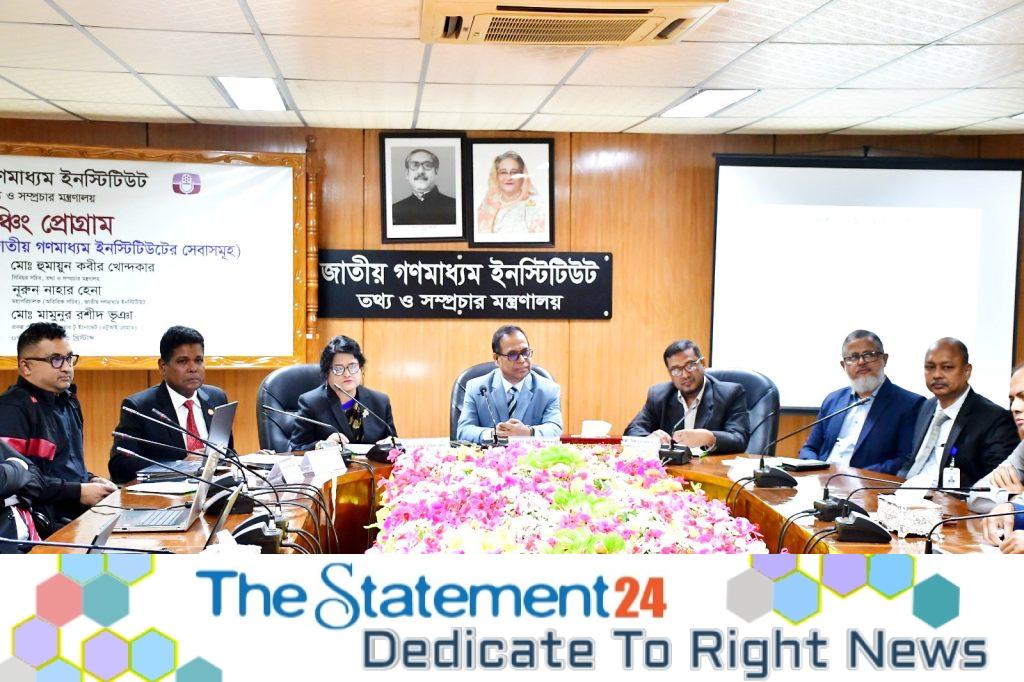
Digitization of four services of National Institute of Mass-communication as part of the rapid digitization activities under the government’s ‘MyGov’ platform has been inaugurated. Organized by the National Institute of Mass-communication and the technical support services of Aspire to Innovate-a2i have been launched on this digital platform. Senior Secretary of the Ministry of Information and Broadcasting Md. Humayun Kabir Khandaker inaugurated the digitized services as the chief guest at a day-long workshop on ‘Unlocking National Institute of Mass-communication Services on MyGov Platform’ on Thursday (November 7). Director General of National Institute of Mass-communication (Additional Secretary) Nurun Nahar Hena presided over the workshop and a2i’s Joint Project Director (Joint Secretary) Mollah Mizanur Rahman was present as a special guest.
The four services of the National Institute of Mass-communication launched on MyGov are- application for media training, certification of trainees of National Institute of Mass-communication, application for rent of premises of National Institute of Mass-communication and online registration.
As the chief guest, Senior Secretary of the Ministry of Information and Broadcasting Md. Humayun Kabir Khandaker stated that the government wants to provide hassle-free services to the citizens. This requires an integrated platform. For this purpose, the government has developed MyGov platform in collaboration with a2i.
Digitization of 17 departments/organizations under the Ministry is ongoing. 4 citizen services of National Institute of Mass-communication have been opened to citizens in the first phase. The services of other companies will be added gradually soon.
He further said, we want to take our services under hundred percent digitization. We want to make our services cashless and paperless and more citizen friendly. Honorable Prime Minister Sheikh Hasina would like to contribute to the realization of the dream of Smart Bangladesh.
Director General of National Institute of Mass-communication (Additional Secretary) Nurun Nahar Hena said that service users can take citizen-friendly services digitally without going to the office. In Smart Bangladesh, services will be available in less time, less cost and less travel. MyGov urged the government officials to ensure all applications of citizens or organizations in the fastest time and highest quality service.
MyGov is an integrated service delivery platform that provides easy integration of existing technology building blocks and e-service systems of Ministries and Divisions/Organizations on the platform. The platform offers a total of 1900 digitized services, including 1200 citizen services. It has been developed by the a2i program to provide government services at the fingertips of the citizens. Presently, MyGov has 40 lakh registered users and has processed 26 lakh out of 27 lakh service applications. The platform has had a positive impact on government services, allowing citizens to easily search and apply for services anytime, anywhere, through the web, mobile app, digital center, or national helpline-333. Once the citizen provides information on MyGov, they do not have to give it again and again to receive the service. The citizen’s profile is auto-filled every time they make an application, greatly reducing time, cost, and travel. Citizens can express their satisfaction and feedback about the service on MyGov.
a2i Project Analyst (Deputy Secretary) Mohammad Salahuddin presented the digitized services. Among others, Bangladesh Secretariat Reporters Forum (BSRF) Acting President MA Jalil (Munna Raihan), Acting General Secretary Mehdi Azad Masum, Training and Research Secretary Farooq Alam and other senior officers and media workers of National Media Institute were present on the occasion.
The a2i, a whole-of-government program implemented by the ICT Division & Cabinet Division, supported by UNDP Bangladesh, catalyzes citizen-friendly public service innovations simplifying government and bringing it closer to people. It supports the government to be at the forefront of integrating new, whole-of-society approaches to achieve the SDGs.

